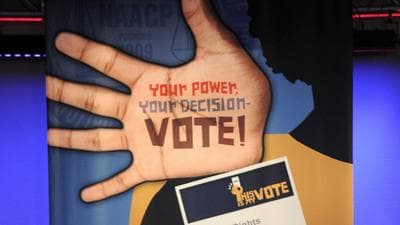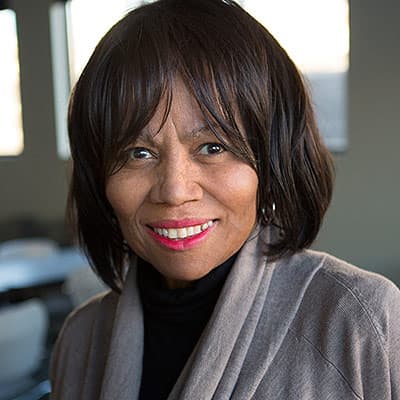Advertisement
Ahead Of NAACP Address, Activists Take Critical Look At Romney's Mass. Civil Rights Record

On Wednesday, presumptive Republican presidential nominee Mitt Romney will address the nation's oldest and largest civil rights organization — the NAACP.
Romney has been criticized for his record on diversity as governor of Massachusetts. But the NAACP audience wants to hear what he has to say about how he would lead the country if he's elected president.
"They'll be polite and they may just sit and listen, and that's it," said Betty Robinson Hansen, a longtime member of the Boston branch of the NAACP, the first chartered branch in the nation.
Michael Curry, the president of the NAACP's Boston branch, says he's been getting calls from all over the country from reporters who want to know what kind of governor Romney was.
"Particularly [reporters want to know] what was the perspective of people of color," Curry said. "The reality was that there wasn't the relationship that we hoped that there would be under Romney. Affirmative action programs, one of the major issues when he was governor, was that there was a change that he proposed that would have turned back some of the gains that we had made here in the state."
Rolling Back Affirmative Action Policy
"What he did was that he eliminated the executive orders and he created a new so-called Affirmative Action Office under a different name, saying it would do the same thing. But there were no enabling acts for that office to be guided by," said Leonard Alkins, who led the local NAACP branch during Romney's tenure as governor.
Romney's move to get rid of the state's long-standing affirmative action policies took place in a deserted State House on Bunker Hill Day in June 2003. When word reached civil rights leaders, black lawmakers and other activists, it sparked a public furor.
The governor responded by creating an advisory panel to recommend changes. Some in the civil rights community saw the new commission as a sham.
Alkins, who was eventually named to that commission, says he struggled to make it work.
"When we were ready to take a final vote on our recommendations, all of a sudden they stopped calling meetings," Alkins said.
But the pressure continued and the governor eventually retreated, leaving the state's old policies in place.
A Lack Of Diversity
"I thought the whole thing with the affirmative action merry-go-round was just atrocious," said Boston media and political strategist Joyce Ferriabough.
Ferriabough says Romney veered from a path set by his predecessors in the governor's office — including three Republicans.
"First of all, the Weld administration, their cabinet, was one of the most diverse. He had women in very high positions in his administration and people of color," Ferriabough said. "Romney ... I can't remember one person of color he had in a high-ranking position in his administration."
State records show that by the end of Romney's tenure, in December 2006, minorities made up 3.6 percent of employees in the governor's office. In contrast, as of March of this year, in the Patrick administration they represent 26.2 percent.
In Romney's executive branch, 11.2 percent of all managers were minorities in 2006. In Patrick's this year, that percentage is 16.4.
Ferriabough calls Romney's record in Massachusetts "abysmal."
"That's why I'm going to be very interested in hearing what he says that he did or what he would do different," Ferriabough said. "But, I have to tell you, he has to be ready to step up with more than what he did here."
More Than Just Civil Rights
Some see Romney's tenure at the State House as offering insight into how he would deal with civil rights issues if he were to win the presidential election. But it's not the only issue NAACP convention-goers will want to hear about. Boston branch President Curry says jobs should be high on the agenda.
"If he's going to argue that he would overturn/repeal the Affordable Care Act, speak to us about the disproportionate number people of color that are uninsured."
Michael Curry, Boston NAACP president
"Our unemployment rate in many cases tends to be two or three times the national unemployment rate or the state unemployment rate," Curry said. "So he has an obligation to come to us and talk about: If he were to be president for all of us, what would he do for communities of color to address the unemployment rate within our communities? If he's going to argue that he — and he said this — that he would overturn/repeal the Affordable Care Act, speak to us about the disproportionate number people of color that are uninsured, that are under-insured."
Ferriabough says she wants to know about the high rate of incarceration among men of color, among other issues.
"There's also a black middle class; we're not all poor and desperate and in need of government services," Ferriabough said. "Small business development, entrepreneurship — you know, the whole gamut. He'd be best not to paint us in a broad stroke of being sort of ships left at the bottom."
An Evolving Position?
"Many elected officials evolve, both black and white," said Richard Taylor, an African-American and Republican who was transportation secretary during the Weld administration and has been in talks with Romney and some of his campaign advisers.
"If one looks at the facts, one looks at the prior record, perhaps more could have been done. But I don't believe that should be dispositive of how one will completely act in the future," Taylor said. "I think that with a good team of advisers, facing the realities of that office, and the strong stakeholders that work with a president, I believe you'll see the governor look at these issues a little differently."
Romney's campaign did not respond to requests for comment.
When he takes to the stage in Houston Wednesday, he won't be the first Republican to address an annual meeting of the NAACP. Ronald Reagan spoke there in 1981, six months into his first term. And George W. Bush, who took a while to accept the invitation, addressed the gathering in 2006.
This program aired on July 11, 2012. The audio for this program is not available.
